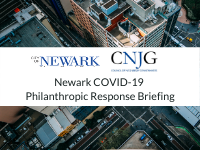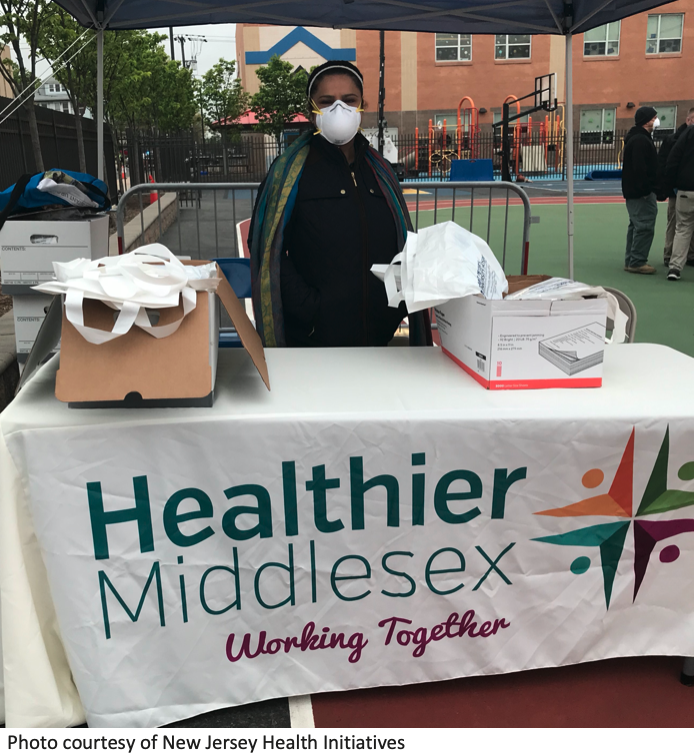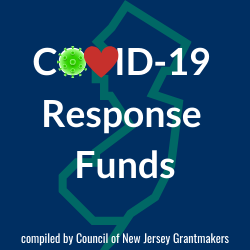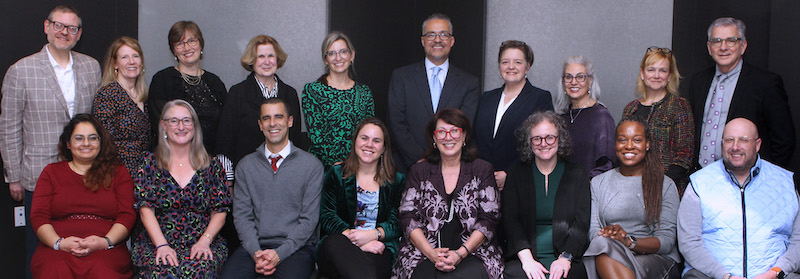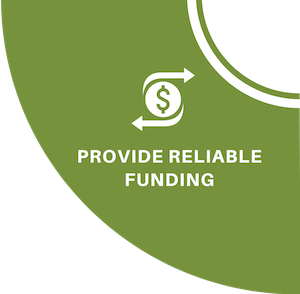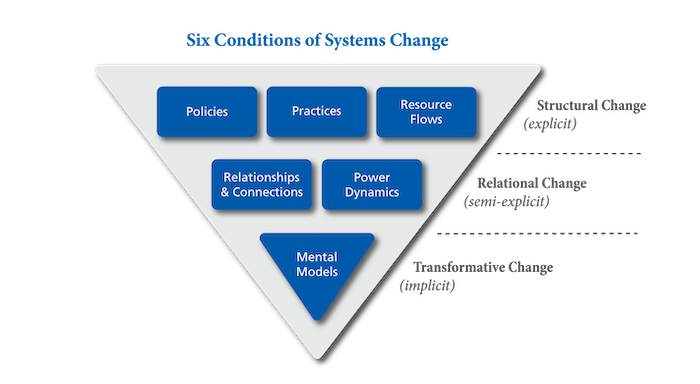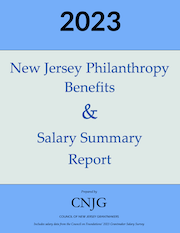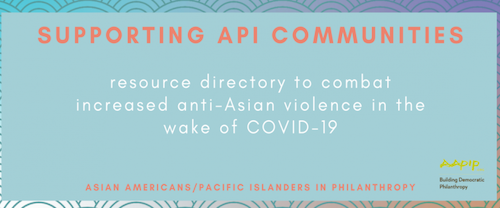Site Search
- resource provided by the Forum Network Knowledgebase.
Search Tip: Search with " " to find exact matches.
In March 2024, Governor Murphy signed into law significant reforms to the ways that New Jersey enforces municipal affordable housing obligations under the state Supreme Court Mount Laurel doctrine. The new law creates enhanced affordable housing opportunities for New Jersey’s low-and moderate-income households, while seeking to streamline the affordable housing development process by setting clear guidelines for determining housing obligations. It is expected to reduce legal costs and judicial involvement. Join Adam Gordon, Executive Director and Emily Devenney, Grants and Development Manager of the Fair Share Housing Center for a conversation about what this new legislation means for philanthropy.
Since the revival and improved enforcement of the Mount Laurel Doctrine in 2015, New Jersey has seen a considerable increase in affordable housing production. However, there remains a substantial shortage of affordable homes in the state, particularly for very low-income residents. The legislation aims to address this gap by ensuring that every municipality contributes its fair share of affordable housing.
Key features of the legislation include a streamlined process for determining affordable housing obligations, codification of methodology for calculating these obligations, increased transparency in the housing development process, and the repeal of the state Council on Affordable Housing (COAH). Additionally, the legislation prohibits wealthy towns from avoiding their housing obligations through regional contribution agreements.
Cost: Free for CNJG Members; $50 for Non Member Grantmakers
Adam Gordon is the Executive Director of FSHC and leads FSHC’s coordinated strategy of organizing, litigation, and policy development to advance racial, economic, and social integration throughout New Jersey and the United States. Since joining the organization in 2006, he has worked to implement the Mount Laurel Doctrine which has created over 70,000 affordable homes in historically exclusionary NJ communities, litigated the largest federal fair housing case in American history, and worked to make federal disaster recovery policy more equitable. Under his leadership FSHC has secured the passage of the first statewide Fair Chance in Housing Act to limit discriminatory tenant screening policies and a landmark $305 million fund to accelerate affordable housing development. Gordon holds a B.A. and J.D. from Yale University.
Emily Devenney joined Fair Share Housing Center as the Grants & Development Manager in January 2024. She comes with experience in fundraising and community organizing, and strong connections to South Jersey, where she was born and raised (and likely will never leave). Emily has a B.A. in Economics and a Masters of Public Policy from the University of Massachusetts Amherst and a Certificate in Fundraising from Villanova University.
Webinar Video
New Jersey’s philanthropic and nonprofit sectors are in the forefront of helping communities respond and recover from the worst health and economic crisis of our lifetime.
On these pages, CNJG offers resources to help our members get the knowledge and information needed to be the most effective possible grantmakers.
CNJG is helping to track New Jersey philanthropy’s pandemic response through our “Get on the Map” campaign partnership with Candid, which launched a coronavirus map in response to funders’ requests. As you can see, the information collected is not complete, so please help. Visit our Share Your Giving Data webpage for information about how to share your COVID-19 grants data.
Sharing information with other funders is critical to informing philanthropy in the weeks and months ahead. Knowing where money is going, and how — and having the latest information — facilitates thoughtful collaboration and decision-making in times of crisis.
CNJG Response
Communications
CNJG created a Coronavirus Response webpage and listserve for the COVID-19 Response
Email to Members: NJ Philanthropic Response to COVID-19 (March 13)
Email to Members: Working Remotely Ensuring Service to Members (March 17)
CNJG participated in: Creative NJ Statewide Conversations - NJ’s Philanthropic Response (April 8)
CNJG Member Query: COVID-19 Rapid Response Funds
CNJG asked their members to share your grants data to update the coronavirus map and track philanthropy’s response to the coronavirus pandemic.
CNJG Member Query: Grant Approval Templates Related to COVID-19
CNJG signed onto letter calling on philanthropy to act to curb bias attacks as virus spreads.
CNJG created a FAQ page about philanthropy’s COVID response.
NJ COVID-19 Response and Recovery Funds Learning Community
The NJ COVID-19 Response and Recovery Funds Learning Community helps grantmakers involved in special purpose COVID 19 funds get timely updates on what is happening on the ground, share information about what and where services and help are needed most, and explore strategies for the most effective grantmaking investments. Designed around the Center for Disaster Philanthropy's key principles of grantmaking -- resilience, equity, sustainability, and civic participation -- the Learning Community is committed to holding the difficult conversations about how philanthropy can best respond to community needs and help those who need it most.
COVID-19 Funders Briefings
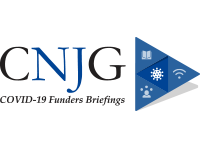 CNJG hosts regular briefings where funders hear from government officials, disaster recovery and health experts, nonprofit leaders, funders, and other stakeholders dealing with the COVID-19 pandemic. The briefings provide an opportunity to share how colleagues are changing grantmaking practices for rapid response, learn about new policies and government actions, and connect with local leaders who work with people whose financial, physical, and mental health suffers due to COVID-19. Series I topics included food insecurity, mapping response funding, racial health disparities, federal and state policy, and updates from New Jersey response funds and Rapid Response Surveys, completed in partnership with the Center for Non-Profits in March, April, and July 2020.
CNJG hosts regular briefings where funders hear from government officials, disaster recovery and health experts, nonprofit leaders, funders, and other stakeholders dealing with the COVID-19 pandemic. The briefings provide an opportunity to share how colleagues are changing grantmaking practices for rapid response, learn about new policies and government actions, and connect with local leaders who work with people whose financial, physical, and mental health suffers due to COVID-19. Series I topics included food insecurity, mapping response funding, racial health disparities, federal and state policy, and updates from New Jersey response funds and Rapid Response Surveys, completed in partnership with the Center for Non-Profits in March, April, and July 2020.
Newark COVID-19 Webinars
CNJG’s Newark Philanthropic Liaison, Kevin Callaghan, organized a series of webinars for our Newark Funders Affinity Group and other funders to know the specific challenges of New Jersey’s largest city responding to the COVID-19 pandemic. Guest speakers included, Mayor Ras Baraka, Newark Public Schools Superintendent Roger Leon, consulting firm McKinsey & Co., and Catherine Wilson, CEO of United Way of Greater Newark.
Affinity and Interest Group COVID-19 Webinars
In order to dig deeper into the impact of the pandemic on certain communities and stay connected during this difficult time, CNJG worked with our affinity group chairs and other members to develop programming that supplemented our COVID-19 Funders Briefing Series and Newark COVID-19 Series. These virtual affinity and interest group meetings were designed for colleagues to update each other on coronavirus response efforts, hear about the greatest needs in their funding area, and share what they have learned.
CNJG Member Actions
News articles showing members philanthropic responses to the coronavirus pandemic which include announcements, emails, blogs, grants given and other resources gathered by and for our members.
New Jersey Focused Response Funds
A list of all of the response funds that foundations and philanthropic organizations have set up to help local communities, residents, non-profits, and businesses throughout New Jersey and news of the grants being awarded by each fund.
PSO, State, and Government Resources
Resources gathered from our colleagues at other philanthropy-serving organizations, state associations of nonprofits, and city, state and federal governments.
State and National COVID-19 News Articles
Some of the top COVID-19 news stories, centrally located for easy access.
CNJG provides this information free to the philanthropic community. If you are not a CNJG member, please join so you can take full advantage of the many benefits of membership and help underwrite the cost of services like this.
By now you’ve heard the sad news. One of New Jersey’s most recognized, accomplished, and beloved leaders in the philanthropic sector passed away on Sunday, January 28.
Jeffrey Vega, President and CEO, Princeton Area Community Foundation, CNJG Board Chair from 2021 to 2023, and Board Trustee from 2016 to 2023, succumbed to an especially rare and aggressive form of cancer.
Jeff joined the CNJG Board of Trustees in 2016. As Board Chair, he led and guided CNJG through the pandemic years, a leadership transition, and strategic planning process. His legacy of leadership includes the 2023 - 2025 Strategic Plan, the creation of a Racial Equity Taskforce, now a committee of the Board, strengthening and improving our governance practices and policies, our first policy agenda, and adoption of the New Jersey Principles for Philanthropy, our equity principles.
 It was with great pleasure that we celebrated Jeff at the Annual Meeting & Holiday Gathering on December 14, as he rotated off the Board, and presented him with a framed gift highlighting and praising his leadership and work with the Council. Jeff shared with me that the event was one of the best days of his life. He told me how grateful he was for the love and friendship he felt in the room. Angie, his wife, accompanied him to the gathering, and recorded the business portion of the meeting. Jeff said, when he and Angie went home, they watched the event with Nico, his son. Jeff was truly happy and touched. It meant so much to him. I’m grateful that we were able to give him that special day.
It was with great pleasure that we celebrated Jeff at the Annual Meeting & Holiday Gathering on December 14, as he rotated off the Board, and presented him with a framed gift highlighting and praising his leadership and work with the Council. Jeff shared with me that the event was one of the best days of his life. He told me how grateful he was for the love and friendship he felt in the room. Angie, his wife, accompanied him to the gathering, and recorded the business portion of the meeting. Jeff said, when he and Angie went home, they watched the event with Nico, his son. Jeff was truly happy and touched. It meant so much to him. I’m grateful that we were able to give him that special day.
The CNJG Board and team are discussing how we can honor Jeff. Once we have a better idea, we’ll share with you. In the meantime, the Princeton Area Community Foundation has created a beautiful tribute – Remembering Jeffrey M. Vega.
On a more personal note, it was an absolute joy to work so closely with Jeff in his role as Board Chair. When Jeff and I were planning the Board agendas and Board discussions, he always wanted to focus on the positive. He always wanted Board members to walk away feeling uplifted, valued, and inspired. He spoke many times about how much he appreciated his Board colleagues, and all the CNJG members. There was a certain kind of harmony that surrounded Jeff. One felt enveloped in that harmony in talking and sharing space with Jeff.
Like all of us, I can’t believe he’s gone, and I miss him. We all miss him. Rest in peace, dear friend, and colleague. Thank you for inspiring us, Jeff. You truly made a difference in the lives of so many. I can truly say that I am a better person for just knowing you. I’ve heard countless others say the same. Your legacy lives on.
Warmly,
Theresa Jacks, President and CEO
Council of New Jersey Grantmakers
The CNJG board is comprised of 20 leaders who come from CNJG member organizations and are elected by the CNJG membership. Each board member provides guidance and leadership to CNJG by serving up to two 3-year terms.
Photo taken after CNJG Annual Meeting on December 11, 2024.
Back Row: Andy Fraizer, Christine Healey, Lucy Vandenberg, Patricia Hartpence, Aaron Turner, Craig Drinkard, Catherine Wilson, Margarethe Laurenzi, Tammy Rice Herman, and Paul DiLorenzo
Front Row: Priti Mehta, Melissa Litwin, Justin Kiczek, Kate Barrett, Theresa Jacks (CNJG), Marcy Felsenfeld, Jasmyne Beckford, and Jeremy Grunin
Not Pictured: Kortney Swanson Davis, Maisha Simmons, and Maria Spina.
CNJG Board Members
Craig Drinkard, Chair, Victoria Foundation
Justin Kiczek, 1st Vice Chair, F. M. Kirby Foundation
Christine Healey, 2nd Vice Chair, The Healey Education Foundation, Inc.
Catherine Wilson, Treasurer, United Way of Greater Newark
Kortney Swanson Davis, Secretary, Forman S. Acton Educational Foundation
Kate Barrett, The Campbell’s Foundation
Jasmyne Beckford, The Prudential Foundation
Paul DiLorenzo, Salem Health and Wellness Foundation
Marcy Felsenfeld, The Healthcare Foundation of New Jersey
Andy Fraizer, Community Foundation of South Jersey
Jeremy Grunin, Grunin Foundation
Patricia Hartpence, NJM Insurance Group
Tammy Rice Herman, New Jersey State Council on the Arts
Margarethe Laurenzi, Maher Charitable Foundation
Melissa Litwin, The Henry and Marilyn Taub Foundation
Priti Mehta, Investors Foundation
Maisha Simmons, Robert Wood Johnson Foundation
Maria Spina, PSEG Foundation
Aaron Turner, Community Foundation of New Jersey
Lucy Vandenberg, Schumann Fund for New Jersey
Theresa Jacks, President & CEO, Council of New Jersey Grantmakers – ex officio
The Board of Trustees are supported by the work of 8 different committees.
Multi-year Grants
Affirmation: Multi-year funds provided both reliability and breathing room for nonprofits.
Making fundamental and long-lasting change comes with the promise of reliable investments. Longer grant terms create an environment where collaborative partnerships can flourish, and trust and transparency break down power dynamics. The result is that nonprofits have the “breathing room” and financial stability to focus activities where they are most needed.
Although many funders award grants to the same nonprofits year after year, they often require submission of annual applications that request information they already have and are complex and needlessly lengthy. These processes can heighten mutual distrust. From a practical standpoint, multi-year awards reduce paperwork for both funder and nonprofit and open communication channels promoting shared goals, mutual trust, and increased overall impact.
Activities
• For funders that historically award repeat annual grants to the same nonprofit partners, shift from an annual grant/proposal cycle to a long-term, multi-year commitment with an annual outcomes/progress report in lieu of a full application.
• Tailor grant terms to suit grantee timelines and needs (negotiated outcomes and milestones).
• If data collection is required solely to meet a funder’s compliance requirements, the funder should assume this responsibility or provide sufficient funding and/or capacity for the nonprofit to meet the requirement.
Short-term Outcomes
• The number of funders making multi-year grants increases by 50% over the previous years.
Long-term Outcomes
• More funders convert an annual application process for repeat grantee partners to a multi-year commitment with an annual outcomes report at the most, instead of full proposals each year.
• Funders assume responsibility for data collection or provide sufficient funding and/or capacity for the nonprofit to meet the requirement.
• Grant terms are suited to grantee timelines and needs (negotiated outcomes and milestones).
How to Begin Doing Good Better on Reliability
Learning opportunities
• What barriers keep funders from making long-term commitments to repeat grantee partners? Are any of these barriers legal?
• What are the minimum data requirements for funders to collect from repeat grantee partners?
Pre-Work
• Address the barriers to awarding multi-year grants through tested tools.
• Learn about how multi-year grants strengthen grantee partners and improve philanthropic, nonprofit, and community impact.
• Research mechanisms funders can use to meet legal compliance requirements while gaining trust in their grantee partners.
Community foundations are beginning to deepen and shift how they work, adopting an anchor mission that seeks to fully deploy all resources to build community wealth. Moving into territory relatively uncharted for community foundations, they are taking up impact investing and economic development — some in advanced ways, others with small steps. This report offers an overview of how 30 representative community foundations — including The Seattle Foundation, the Vermont Community Foundation, and the Greater Cincinnati Foundation — are working toward adopting this new anchor mission.
This Democracy Collaborative report was written by Marjorie Kelly, Senior Fellow and Director of Special Projects and Violeta Duncan, Community Development Associate.
Resources gathered from our colleagues at other philanthropy-serving organizations, state nonprofit associations, and city, state, and federal governments.
Philanthropy Serving Organizations Resources
Candid: Funding Summary for Global Philanthropic Response
Center for Disaster Philanthropy
Disaster Philanthropy Playbook
Complex Humanitarian Emergencies: Philanthropy’s Role in Recovery Webinar - Held 2/13/2020
COVID-19 Coronavirus: How Philanthropy Can Respond Webinar - Held 3/5/2020
COVID-19: Past Epidemics and Vulnerability - Lessons for Funders Webinar and Webinar Slides - Held 3/26/2020
COVID-19: Making Effective Rapid Response Grants Webinar and Webinar Slides - Held 4/14/2020
COVID-19: Managing Multiple Disasters Amid the Pandemic Webinar - Held 4/28/2020
Report: Philanthropy and COVID-19 in the First Half of 2020 - May 2021
Report: Philanthropy and COVID-19 Measuring One Year of Giving - March 2021
Report: Philanthropy and COVID-19 Examining Two Years of Giving - May 2022
Center for High Impact Philanthropy: COVID-19 Pandemic: Resources
Council on Foundations
Philanthropy’s Response to Coronavirus Outbreak Resource Page
Sharing Approaches to COVID-19 Community Response Webinar and Webinar Slides - Held 3/12/2020
Funders: Sign the Council on Foundations’ Pledge to act with urgency, loosen restrictions, reduce what you ask of non-profits, contribute, communicate, and listen.
Exponent Philanthropy:
Resources for Lean Funders
Blog: How Lean Funders Are Responding to COVID-19
Funders Together to End Homelessness:
COVID-19 Response and System Redesign: Recommendations for Philanthropy to Support Solutions to End Homelessness
Grantmakers for Effective Organizations: Smarter Grantmaking Practices During—and Beyond—COVID-19
Minnesota Council on Foundations: Coronavirus Webinar and Webinar Slides - Held 3/4/2020
National Center for Family Philanthropy
COVID-19: Response and Recovery Resources
Family Philanthropy’s Response to COVID-19 Webinar - Held 3/27/2020
National Center for Responsive Philanthropy: Local Foundation Funding for Immigrant & Refugee Groups
Philanthropy New York
COVID-19 Updates & Resources
Preparing for COVID-19: Philanthropy’s Response in Times of Crisis Webinar - Held 3/12/2020
Philanthropy Network of Greater Philadelphia: Philanthropy’s Response to the Coronavirus
United Philanthropy Forum
3/12 Letter to Congress - Include Nonprofits in Coronavirus Package
3/18 Letter to Congress - Nonprofit Community COVID-19 Stimulus Letter
State Nonprofit Association Resources
New Jersey Center for Nonprofits: Resources for Non-Profits in Response to the COVID-19 (Coronavirus) Outbreak
1st Rapid Response Survey Report
2nd Rapid Response Survey Report
Washington Nonprofits: Open Letter to Funders
Government Resources
Center for Disease Control and Prevention: Coronavirus Disease 2019 (COVID-19)
City of Newark: News & Updates
Federal Emergency Management Agency: A Guide to the Disaster Declaration Process and Federal Disaster Assistance
NJ Department of Health: Up-to-date Information about the Coronavirus (COVID-19) in New Jersey
State of New Jersey: COVID-19 Information Hub
U.S. House of Representatives: House passes HR 6201: Families First Coronavirus Response Act
World Health Organization: Coronavirus disease (COVID-19) outbreak
Additional Resources
Condon O’Meara McGinty & Donnelly, LLP: Guidance for Private Foundations
Horizon Blue Cross Blue Shield of New Jersey, through its philanthropic arm, The Horizon Foundation for New Jersey, issued $555,000 in grants to 15 non-profit organizations for health, cultural programs and disaster relief throughout New Jersey during the third quarter of 2021.
The Foundation’s mission is to support organizations that make New Jersey healthier.
A total of $50,000 in disaster relief grants was awarded to the following organizations to support designated FEMA disaster areas and fill the gaps in the response effort:
- $25,000 to Community FoodBank of New Jersey
- $25,000 to ReNew Jersey: Ida Relief
Other grants issued in the third quarter include:
AtlantiCare Foundation, through the Community Foundation of New Jersey, in Morristown, received a $50,000 grant to support the Atlantic City Patient Transportation project, which provides free, easily accessible and reliable transportation for low-income patients in Atlantic City, using the health system’s services.
Diabetes Foundation, in Hackensack, received a $30,000 grant to support Improving Health Outcomes through Education and Guidance, a prevention and education program provided in English and Spanish, for patients with pre-diabetes and diabetes.
Food Bank of South Jersey, in Pennsauken, received a $25,000 grant to support Prevent T2, an evidence-based intervention for seniors designed to delay and/or prevent the onset of Type 2 diabetes.
Garden State Equality Education Fund, in Asbury Park, received a $25,000 grant to support the Adverse Childhood Experiences (ACEs) Self-Healing Community Model, which addresses the impact of trauma and ACEs on mental and physical health among LGBTQ+ and other marginalized communities in Camden.
George Street Playhouse, in New Brunswick, received a $75,000 grant to support the production of Anytown, a musical drama for students in grades 7-12, focusing on the challenges and consequences of opioid abuse and its impact on teens and families.
Greater Newark Health Care Coalition, in West Orange, received a $50,000 grant to support the Greater Newark Community Health Worker (CHW) Learning Collaborative, a project that promotes the growth, leadership and interconnections of CHWs in the Greater Newark region through monthly meetings, resource sharing and training.
Hopeworks ‘N Camden, in Camden, received a $20,000 grant to support Returning Stronger, which is focused on the development of a youth-built, youth-focused, easy-to-access website, to help young people find relevant mental health resources.
Mercer Council on Alcoholism & Drug Addiction, in Trenton, received a $20,000 grant to support the Community Oriented Recovery Effort (CORE), a pilot project to create and promote a larger, more inclusive space for those in the recovery community in Trenton and the surrounding area.
Millhill Child and Family Development Corporation, in Trenton, received a $20,000 grant to support Eat Right, Keep Moving, an obesity education and prevention program that aims to build a Culture of Health within the communities that Millhill serves.
Newark Boys Chorus School, in Newark, received a $40,000 grant to support the school’s music and concert touring programs, as well as academic initiatives.
The Newark Museum of Art, in Newark, received a $100,000 grant to support The Horizon Foundation Community Days, which occur once a month and provide free diverse programming for all ages.
Saint Vincent Academy, in Newark, received a $25,000 grant to support the Horizon Blue Cross Blue Shield of New Jersey Leadership Promise Scholarship, which provides one four-year scholarship to a Greater Newark-area student.
St. Benedict’s Preparatory School, in Newark, received a $25,000 grant to support the Steven Grossman Student Counseling Center, which provides students with mental health education, resources and services.
This advocacy and civic engagement toolkit is designed for community and public foundations that want to educate and encourage their grantees about getting involved in civic and policy activities to increase organizational capacity and impact. While its primary focus is on the grantmaking activity of these foundations, the toolkit also addresses rules and guidance for policy involvement by foundation officials acting on behalf of their foundations.
Learn how you can register for events online, search the member directory for organizations and colleagues who have the same interests, and update your profile.

There is a plurality of definitions of the term systems change, each contextualized within different cultures and purposes. Doing Good Better embraces systems change as an inter-sector process that addresses complex social problems nonprofits and funders confront with collective action centered on equity, mutual respect, and resilience. Systems change refers to changing the parts and their relationships within a system with the understanding that this change will have ripple effects. As grantmakers, we need to create an environment that enables grantee effectiveness, so they can deliver on their mission. Systems change in philanthropy focuses on structures, policies and processes, resources, values, power, mindsets and, infrastructure that is illustrated in three iterative phases. In time, we hope that the application of this model will result in collective impact and a more resilient social sector for all of New Jersey.
The first phase is structural (operational) change, which involves funders adopting new policies, practices, and resource flows. The second phase is characterized by new relationships and connections that emerge from structural change eschewing old power dynamic practices. Finally, the third phase is transformative change, which occurs when change becomes rooted in organizational culture and mores. We cannot underestimate the length of time and learning at each stage. Achieving transformative change can be a long journey, but it is a learning journey. One grantmaker stated, “One change led to another and another, like dominos. I started to see what people meant by systemic change. New energy and excitement surged among us as hope grew and the cloudy vision of what we wanted became clearer and clearer.”
Although the figure below displays the six developmental stages as linear and distinct, change is unlikely to follow a linear path. Any change in a system will seldom stay fixed at one of these stages but rather will shift back and forth from one stage to another on the path toward the ideal state. We believe just one organization can’t shift the conditions that hold problems in place; we all must share the same perspectives and move the sector together and simultaneously. We call for all of those involved in the sector to work together to build a better and more equitable nonprofit and philanthropy system for all New Jerseyans.
Graphic comes from “The Water of Systems Change” by John Kania, Mark Kramer, and Peter Senge.
Doing Good Better, a partnership of the Council of New Jersey Grantmakers and the New Jersey Center for Nonprofits, is a community of funders and nonprofits taking action against the power imbalances and racial inequities in philanthropy, nonprofits, and government.
During 2023, CNJG gathered benefits information from our members to generate our 2023 New Jersey Philanthropy Benefits & Salary Summary Report. Members tell us that this report is one of the most important and effective benchmarking tools for our field. A statistically significant number of members completed our Benefits Report. We are grateful to those that completed the survey, which is a major investment of time, to help us gather this useful data.
The report consists of two sections:
CNJG Benefits Survey
CNJG and our members want specific data about the benefits offered to their employees, board, and more. Therefore, CNJG created our triennial Benefits Survey that gathered this comprehensive data specific to New Jersey’s grantmaking community.
For the second time in this survey’s history, we asked for board and staff demographic data. As more attention is focused on racial equity in our work, it is helpful to benchmark this data in graphical form. We hope it sparks conversation at your organization.
Council on Foundations (CoF) Salary Survey
The salary survey was administered by our partners, the Council on Foundations. This annual nationwide effort by CoF (with the assistance of other Philanthropy-Serving Organizations across the country) benchmarks the salaries of employees at foundations, corporate giving programs, and other philanthropic organizations. CNJG encourages any and all members to complete this survey each year.
Salary information from CoF presents national, mid-Atlantic, and New Jersey data for over 40 staff positions. Salary ranges are only given for positions with five or more reporting organizations. To report on more New Jersey salary data, we hope more members will complete this annual survey.
CNJG reminds our members and other foundations across New Jersey to complete both surveys when they are available – CoF’s is EVERY YEAR, and CNJG’s is every three years. The more data we and CoF can gather, the better and more accurate the results will be for the philanthropic community both in the state and nationally.
Download the 2023 New Jersey Philanthropy Benefits & Salary Survey Summary Report here. You must be a member of CNJG and logged in to access the report.
CNJG's past Summary Reports may be found on our website:
2020 New Jersey Philanthropy Benefits & Salary Survey Summary Report, released in January 2021
2017 New Jersey Foundation Benefits & Salary Summary Report, released in September 2017
2014 New Jersey Foundation Benefits & Salary Summary Report, released in February 2015
2011 Mid-Atlantic Foundation Benefits & Salary Summary Report, released in June 2012
We’re thrilled to announce the Council of New Jersey Grantmakers’ 2024 Spring Colloquium – a timely conversation exploring the transformative power of Artificial Intelligence (AI) and data in the social sector.
Empowering the Future: Harnessing AI and Data for Philanthropic Social Impact will take place on Tuesday, June 18th, 2024, at the New Brunswick Performing Arts Center opening at 9:30 AM with networking and check-in, Resource Marketplace, and continental breakfast.

The main event begins at 10:30 AM and will feature a distinguished panel discussion moderated by Jean Westrick, Executive Director of the Technology Association of Grantmakers, (TAG). Our esteemed panelists will delve into critical topics such as:
- Optimizing Problem-Solving: How can AI enhance our ability to address social issues without sacrificing human connection?
- Equity in Action: How can we ensure AI is used ethically and fairly to promote a more equitable society?
- Funding for the Future: How are foundations leveraging AI for strategic grantmaking initiatives?
- Gen Z and AI: What role will AI play in shaping the future generations of philanthropic leaders?
Following lunch and conversation, we’ll have 2 afternoon sessions focused on the practical side of AI usage for foundations and nonprofits. The Spring Colloquium is your chance to gain valuable insights from leading experts, network with fellow New Jersey grantmakers and nonprofit leaders, and discover innovative strategies for using AI to maximize your own social impact.
Registration is now open! We’re opening registration exclusively to CNJG members until Friday, April 26, so please secure your spot for this essential event by registering today.
As this is such an important topic for our sector, I invite you to consider sponsorship of the event. Sponsorship is an excellent opportunity to support our work, while also increasing visibility for your own organization and philanthropic efforts. We have a number of outstanding sponsorship opportunities for this event. Please reach out to me if you need more information or require an online application to secure your sponsorship. We can also customize a sponsorship package for you. Thank you to our sponsors to date: Connector Sponsors - Campbell Soup Company, Sixers Youth Foundation and Robert Wood Johnson Foundation.
In the coming weeks, we’ll share more details about the 2024 Spring Colloquium, including the full panel line-up. Stay tuned for further updates in the newsletter and on our website.
We look forward to seeing you there!
Sincerely,
Theresa Jacks, President and CEO
Council of New Jersey Grantmakers
As we settle into the festive spirit of the holiday season, it's the perfect time to take a step back and reflect on the impact we've made - and the exciting possibilities ahead. I'm reaching out once again to remind you about the CNJG Annual Meeting & Holiday Gathering - our key year-end event where we gather to reflect, learn, and most importantly, strengthen the connections that make our work in philanthropy so impactful.
This year's theme, Inspiring Change through Leadership: Maximizing Philanthropic Impact, is about how we can use leadership to drive meaningful and lasting change. I'm excited to share that this year's gathering will offer an inspiring mix of learning, reflection, and connection - an opportunity to think about where we've been and where we want to go next.
Here's what to look forward to:
- Leadership in Action Workshop: We'll be diving into the New Jersey Principles for Philanthropy with a panel of CNJG members who have led the efforts for CNJG to adopt the principles. The panelists will discuss how they are aligning their work with the principles, where some challenges lie ahead, and how we can promote these principles within our organizations to engage in further work. It will be an excellent opportunity to learn, discuss, and brainstorm how you, too, can apply these guiding principles to your own work and further strengthen your organization's impact.
- Keynote Address by Amalia Brindis Delgado: I'm especially excited about our keynote speaker, Amalia Brindis Delgado, Chief Strategy Officer, Panta Rhea Foundation. Amalia will speak on leadership and leadership transitions as well as share insights from her work with Leading Forward and Resilience & Renewal Grantmaking. Her talk will offer valuable lessons on navigating change and building organizational resilience - something that's more important than ever as we look towards the future of philanthropy.
A Special Announcement:
I'm also pleased to share that we have a new face joining the  CNJG team. Please join me in welcoming Fortunata Cuomo as our new Development Associate. Fortunata brings a wealth of experience in nonprofit fundraising, and we're excited for you to meet her at the Annual Meeting. Her role will focus on improving and expanding our sponsorship and Resource Marketplace programs, managing all aspects of our grant funding, and spearheading efforts to build new revenue streams. This position is a critical investment in CNJG to help us expand our business model and create new opportunities to generate revenue.
CNJG team. Please join me in welcoming Fortunata Cuomo as our new Development Associate. Fortunata brings a wealth of experience in nonprofit fundraising, and we're excited for you to meet her at the Annual Meeting. Her role will focus on improving and expanding our sponsorship and Resource Marketplace programs, managing all aspects of our grant funding, and spearheading efforts to build new revenue streams. This position is a critical investment in CNJG to help us expand our business model and create new opportunities to generate revenue.
With just a few days to go, I encourage you to take a moment to register for the Annual Meeting (if you haven't already) and join us for what promises to be an inspiring, energizing day of conversation and connection. We are truly looking forward to seeing you on December 11 at APA Hotel Woodbridge in Iselin.
A big thank you to our sponsors to date - we couldn't do this without you! Special thanks to Signature Sponsor – Prudential; Contributing Sponsors – Campbell’s, Devils Youth Foundation, Robert Wood Johnson Foundation, and Victoria Foundation; Supporting Sponsors – Grunin Foundation, LISC NJ, Pincus Family Foundation, and WSFS Bank; and Colleague Sponsor – Horizon Blue Cross Blue Shield of New Jersey.
Warmly,
Theresa Jacks, President and CEO
Council of New Jersey Grantmakers
In response to the murders of George Floyd, Breonna Taylor, Tony McDade, Ahmaud Arbery, and countless other Black individuals, we have seen a call to end systemic racism, police brutality, and injustice. To explore philanthropy's role in fighting against racism and injustice, CNJG is sharing information about upcoming programs that we and our Philanthropy-Serving Organizations are presenting and other resources below. While some programs or resources have been organized in direct response to recent protests and calls for action, all are part of a longer conversation on racism in our country and within our sector. As CNJG weaves equity into all of our work, we look forward to continuing these conversations with you.
We realize this is not a comprehensive list, and we are posting items that CNJG staff sees, which is not nearly enough. We ask that our members, especially those who are black and brown, to help us find articles written by, resources created by, and programs led by people of color. Share those resources by emailing us. This page is just a part of our work in equity. We created this page as one starting point for New Jersey’s philanthropic community to engage in conversations, do background reading, attend programs, learn, and take action.
For those members interested in continuing the conversations, we invite you to join our Racial Equity listserve, by emailing Craig Weinrich. On that listserve, members can share information, resources, and opportunities that are helpful to the funding community.
Visit these Websites
Asian Americans/Pacific Islanders in Philanthropy (AAPIP) Resource Directory
This Supporting API Communities Resource Directory was developed to mobilize the philanthropic sector towards meaningful action in the midst of heightened violence and hate targeting Asian American communities.
Participatory Grantmaking
A curated list of resources and articles from Candid on the movement of participatory grantmaking that engages the community in the grantmaking process.
The Power of Asset Framing: A Conversation with Trabian Shorters
This blog post by the Skillman Foundation contains a series of short videos by Trabian Shorters, founder and CEO of BMe Community, who describes shifts in narrative that all philanthropy should consider.
Putting Racism on the Table
This site created by the Washington Regional Association of Grantmakers is the inspiration for CNJG’s Race, Racism and the Ramifications for Philanthropy Series.
Race to Lead Series
A site with reports and surveys on the racial leadership gap in the nonprofit sector.
Stanford Social Innovation Review
The Struggle to Overcome Racism, a list of resources to help leaders of social change and activists.
Trust-Based Philanthropy Project
A peer-to-peer learning and advocacy initiative to make philanthropy more based on trust.
Please join the Environmental Funders Affinity Group and the Health Funders Affinity Group for a virtual lunchtime discussion with the NJ Department of Environmental Protection's Chief Strategy Officer, Kati Angarone and Manager NJDEP’s Office of Environmental and Public Health, Christine Schell. This session is designed to explore the connections between the environment and health with emphasis on climate change, environmental justice, and water to educate the philanthropic community on the ways that NJ government is addressing these challenges. The discussion will highlight NJDEP’s efforts to address the impact of these intersecting issues on diverse NJ communities and explore philanthropic opportunities to support local and statewide solutions.
Kati Angarone has worked for NJDEP for over twenty-five years. In her current role, she works to advance strategic initiatives, including expanding public access to environmental information, increasing the visibility of DEP programs and services, cultivating external partnerships, and coordinating strategic planning on cross-media issues. She also oversees the efforts of NJDEP’s Office of Legislative Affairs and our Office of Environmental and Public Health Analysis.
Christine Schell is a 30+ year veteran of the NJDEP and currently manages the NJDEP’s Office of Environmental and Public Health Analysis. In partnership with the New Jersey Department of Health (NJDOH), Christine jointly coordinates New Jersey’s Environmental Public Health Tracking Program through a CDC grant, and oversees the development, implementation, and dissemination of data analyses and visualization tools designed to integrate public health concerns into local and state decision making, planning, and the implementation of meaning actions on a broad array of issues, including environmental justice, climate resilience, and sustainability.
Cost: Free for CNJG Members; $75 for Non Member Grantmakers
Webinar Video
Links and Resources:
Healthy Community Planning NJ
Potential Lead Exposure Mapping
Heat Hub NJ
Environmental Justice Mapping, Assessment, and Protection
New Jersey Department of Environmental Protection
One Health
Climate Change
Climate Change in New Jersey Storymap
Healthy Community Planning
New Jersey Protecting Against Climate Threats
Inland Flood Protection Rule
Resilient Environments and Landscapes
Chill Out NJ
Small BIPOC organizations and/or historically excluded/led
organizations have greater access to funding.
Affirmation: We must center the most marginalized, underfunded, and impactful organizations.
BIPOC, grassroots, and/or historically excluded1 leaders are the most proximate to the populations and communities that face the most pressing social issues and should be central to designing solutions and funded; yet they are often overlooked or ignored as real change-makers.
They are underinvested in by major funders and are often left to struggle on their own; and when they are funded, grants are small and often highly restricted.
Some funders have artificially high budget requirements, require collaboration with larger “more sophisticated” organizations, won’t fund fiscally sponsored groups, or emphasize leadership requirements that are increasingly out of date or exclude vital lived experience.
Community organizations are exploring innovative and egalitarian management structures, such as co-directorships, collectives, and collaboratives, that do not resemble the constructs of the past.
Leadership comes in all structures, sizes, and identities; funders must seek to recognize and fund those who are doing effective work and re-evaluate their views of accepted leadership patterns. For BIPOC, grassroots, and/or historically excluded leaders to succeed, we must provide flexible resources and professional development support while they are leading.
Activities
Below are activities your organization can engage in that will advance your equity focus
• Agree as a community of practice to a shared definition of BIPOC, grassroots, and/or historically excluded-led organizations to foster a common frame of reference to help guide this work.
• Create networking and referral opportunities for BIPOC, grassroots, and/or historically excluded leaders to expand their access to funding and opportunities similar to that of larger, mainstream groups.
• Invest in the development and pipeline of BIPOC, grassroots, and/or historically excluded leaders.
• Remove funding barriers for small BIPOC, grassroots, and/or historically excluded organizations that have traditionally been precluded from funding because of budget size, leadership structure, auditing requirements, and similar obstacles.
• Actively partner with BIPOC, grassroots, and historically excluded organizations to make funding decisions on issues closest to their communities.
• Provide significant, multi-year, general operating funding to organizations and movements led by BIPOC, grassroots, and/or historically excluded communities.
Short-term Outcomes
• Progress is tracked into addressing the barriers to funding BIPOC, grassroots, and historically excluded-led organizations in NJ.
• A greater number of BIPOC, grassroots, and/or historically excluded-led organizations are funded than before, by new and existing funders.
• Professional development and capacity building as requested by BIPOC, grassroots, and/or historically excluded leaders is funded.
Long-term Outcomes
• BIPOC, grassroots, and/or historically excluded leaders can access funding and opportunities similar to that of larger, mainstream groups.
• A greater percentage of support to organizations and movements led by BIPOC, grassroots, and historically excluded communities is provided as significant, multi-year, general operating funding. In this context, “significant” can refer to both the quantity, size or percentage of grants awarded by the funder in any given year.
How to Begin Doing Good Better on Equity
Learning opportunities
• Which criteria and practices are creating, perpetuating or exacerbating exclusion of BIPOC, grassroots, and or historically excluded-led organizations?
• For funders that exclude or limit funding to small organizations, why are these barriers in place? What biases or missed opportunities are resulting from these obstacles?
• When funders are actively prioritizing BIPOC, grassroots, and historically excluded -led organizations in their philanthropic partnerships, what definitions, outreach, and partnership strategies are being used? How has this evolved based on lessons learned?
Pre-Work
• Funders should become educated about how traditional ways of identifying grantees and other criteria often excludes BIPOC, grassroots, and/or historically excluded-led organizations.
• Actively seek and share ways to center, identify, fund, and partner with applicants or community-based partners to create solutions in all efforts.
• Identify forums or protocols for introductions, dialogue, and relationship-building between funding community and BIPOC, grassroots and/or historically excluded-led organizations to pave the way for ongoing or stronger partnerships.

